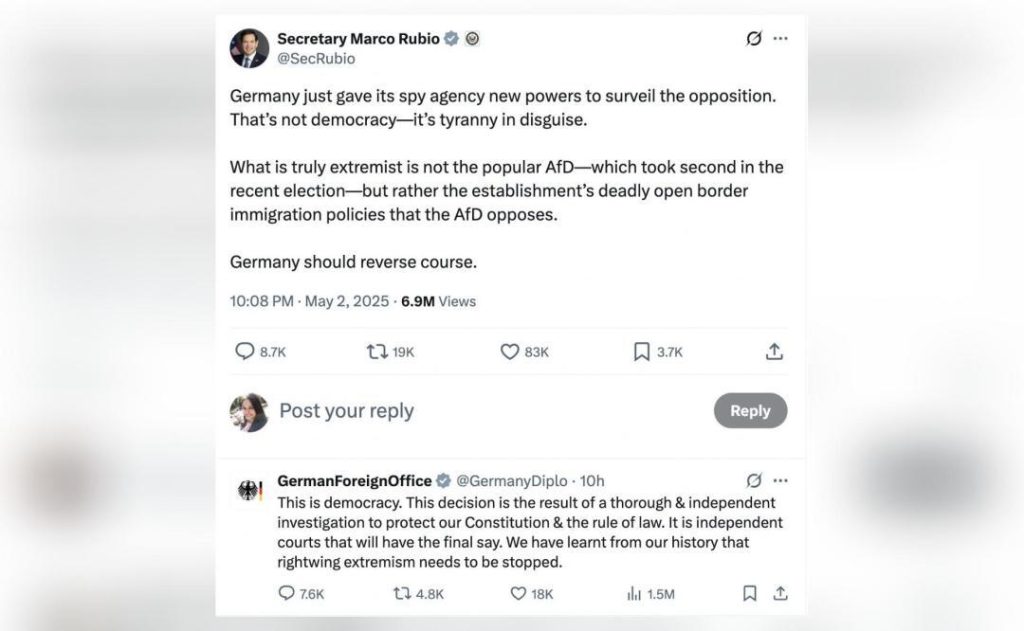
US’ Rubio & German Govt Clash Over AfD Party’s ‘Extremist’ Tag
In a recent diplomatic spat, US Secretary of State Marco Rubio and Germany’s Foreign Ministry have clashed over the German government’s decision to term the far-right Alternative for Germany (AfD) party as “extremist”. The controversy has sparked heated debate about the nature of extremism, political polarization, and the role of governments in addressing these issues.
The disagreement began when Germany’s domestic intelligence agency, the Federal Office for the Protection of the Constitution (BfV), officially designated AfD as an “extremist” organization, citing its anti-constitutional and anti-democratic activities. This move was seen as a significant escalation in Germany’s efforts to tackle the growing influence of far-right groups in the country.
However, US Secretary of State Marco Rubio was quick to express his disapproval of the German government’s decision, accusing them of enabling “tyranny in disguise”. In a statement, Rubio claimed that the German government’s labeling of AfD as an “extremist” organization was an attempt to silence political dissent and undermine democratic values.
“The decision to label the AfD as an extremist organization is a dangerous and misguided attempt to silence political dissent and undermine democratic values. It is a result of a flawed and biased approach that ignores the legitimate concerns of German citizens and enables tyranny in disguise,” Rubio stated.
In response, the German government defended its decision, citing the need to protect its constitution and democratic values. “The decision regarding AfD is a result of thorough investigation to protect our Constitution,” a government spokesperson said.
The controversy has raised important questions about the nature of extremism and the role of governments in addressing these issues. While some argue that AfD’s anti-constitutional and anti-democratic activities justify its designation as an “extremist” organization, others claim that the label is a form of political repression and censorship.
The debate has also highlighted the growing political polarization in Germany, with AfD gaining significant traction in recent years. The party has capitalized on widespread discontent among German citizens, particularly in response to the country’s immigration policies and economic challenges.
AfD’s rise to prominence has led to concerns about the erosion of democratic norms and the increasing influence of far-right ideologies in German politics. The party’s anti-immigrant and anti-Muslim rhetoric has been criticized for fueling xenophobia and intolerance, and its members have been accused of spreading hate speech and inciting violence.
In light of these concerns, the German government’s decision to designate AfD as an “extremist” organization can be seen as a necessary step to protect democratic values and prevent the erosion of constitutional principles. By labeling AfD as extremist, the German government is sending a clear message that such ideologies and activities will not be tolerated in the country.
However, the controversy surrounding the decision also raises important questions about the definition of extremism and the role of governments in addressing these issues. It is crucial that governments strike a balance between protecting democratic values and respecting the rights of political dissent.
In conclusion, the clash between US Secretary of State Marco Rubio and the German Foreign Ministry over the AfD party’s “extremist” designation is a complex issue that highlights the challenges of addressing political extremism in a democratic society. While the German government’s decision to label AfD as an “extremist” organization may be seen as a necessary step to protect democratic values, it is also essential to ensure that such measures do not infringe upon the rights of political dissent and respect the democratic principles that AfD claims to uphold.
Source:



